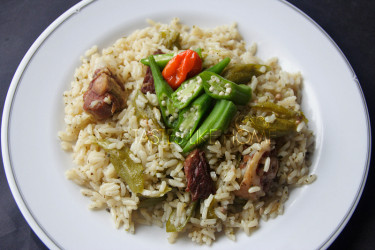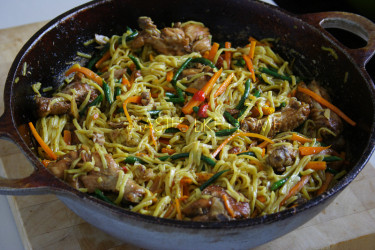Hi Everyone,
“Sweet Hands means that a person is so talented in the kitchen that anything he or she makes… is like manna from the Gods.” That is how American journalist, chef and cookbook author, with roots in Trinidad, Ramin Ganeshram, explained the title of her book back in 2010 when it was published. Many of us may be more familiar with the terms: “Yuh hand sweet,” “she hand sweet,” or “he hand sweet.” What is this special talent that some cooks possess? Sweet-hand compliments are not bandied about wantonly, so what is it that elevates the cooking of one person over another? Is there a secret? Is it a talent that you’re born with? Is it something learnt?

‘Sweet hands’ is having the ability to transform ingredients – simple or complicated – into something that is outstanding in taste whether it is a food or beverage, although the term is usually only related to food. I believe that the true mark of a ‘sweet hands’ cook is the skill to turn the most mundane of ingredients into a dish that delights the palette and celebrates it qualities. For me, whenever I hear of ‘sweet hands’ I immediately think of the highly skilled cooks of various cultures around the world who at one time or another would have been involved in peasant cooking. Peasant cooking is preparing food using accessible, inexpensive ingredients. Back in the day, this was known as ‘poor man’s food’ and it was always about making do. The hallmark of many of these ordinary dishes was that they would have been prepared by folks who were skilled in preparation and knowledgeable about food through inventiveness, experimentation and skills passed down from one generation to the next. That is why, today, you will hear people say they prefer the food of their granny, mother, father, uncle or aunt, because they “know their hand.”

A few years ago I was invited to Christmas lunch at a hotel-restaurant of friends. During the greetings, a gentleman got up and said that he could not pass up the chance to come and enjoy the ‘sweet hands’ of the sisters who prepared the meal, especially at Christmas.
As a side note, ‘sweet hands’ philosophy is something that many eateries – small and large – should certainly heed. Consistency of taste, texture, flavour and quality is why people keep going back and recommending their establishments.

‘Sweet hands’ is also about seasoning of the food. Growing up at home, mommy would have my sister Pat and I do certain prep work, we were her sous chefs, and even though we each felt confident and capable enough to cook some of the dishes, mommy always insisted on doing the actual cooking herself and seasoning of the dishes. By seasoning I mean the adding of herbs, spices, salt and pepper to any of the dishes. When it came to making cakes, we were saddled with the repetitive task of ‘creaming’ the butter and sugar by hand. She looked on from the side of her eyes while measuring and sifting the flour to ensure that we were beating the eggs with enough vigour and speed, but when it came to actually mixing the ingredients together, we only got to look on, and were rewarded with streaks of batter left back in the mixing bowl.
For roti(s) mommy insisted on kneading the dough herself to set the foundation for a light, fluffy paratha. For curries, we were allowed to mix the paste of ground spices, herbs, garlic, onions and pepper but the task of frying the spice mixture and to chunkay the curry was mom’s. For fried rice, she steamed the rice herself, although we had seen her measure the rice and water a million times and we knew exactly the degree of flame/heat to cook the rice. While we sliced the bora into perfect thin slices and uniformly diced the carrots, Mommy did the stir-frying and relevant seasoning.
A friend and author Monica Bhide wrote recently that she too got to help chop and prep ingredients for her mom and aunts without ever being allowed to actually cook the ingredients. However, one day, she considered it the ultimate respect when they allowed her to season their dishes – “to add spices in the right order and in the right combination.” I nodded and smiled as I read because I felt the same way when I got a chance to season the food. I felt as if I had passed a test, a rite of passage if you will.
‘Sweet hands’ cooks have knowing hands and eyes, ask them for a recipe or measurements and then their ‘secret’ is revealed – a handful of this, a lil bit of that, a little touch only, a sprinkling, a ‘can-chee’ piece, like so long (with them pointing to various parts of their fingers, hands or forearms). The first time I wanted to make mauby I called to ask mommy how much bark to use, mommy’s measurements went something like this – about 3 or 4 pieces, like the length of the index finger. “Mommy,” I said, “Your hands and my hands are different so the length of the fingers are not exactly the same. And besides, you know that the bark are often broken up so I might not get 3 or 4 pieces of the same length, and one other thing, you know that sometimes, the bark is curled like some cinnamon sticks.” My mother had a good laugh. I muddled my way through and fortunately the mauby turned out well but when I had to get the measurements for my book, I waited until mommy visited, watched her eyeball the mauby bark and then hand me a few pieces that I promptly measured on a digital scale! ‘Sweet hands’ cooks ain’t easy, yuh hear but I won’t trade them for all the riches in the world.
All my life, up to today, I am fortunate to have had and still have access to many ‘sweet hands’ cooks. I am forever their student. If you find one or know of any, and you have an interest in food and cooking, spend time with them, you’ll not only learn about food, but about living, life, and so much more.
Cynthia





